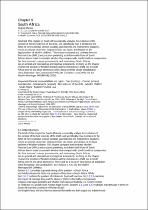| dc.contributor.author | Moosa, Najma | |
| dc.date.accessioned | 2022-09-02T09:17:36Z | |
| dc.date.available | 2022-09-02T09:17:36Z | |
| dc.date.issued | 2017 | |
| dc.identifier.citation | N. Yassari et al. (eds.), Parental Care and the Best Interests of the Child in Muslim Countries, DOI 10.1007/978-94-6265-174-6_9 | en_US |
| dc.identifier.isbn | 978-94-6265-174-6 | |
| dc.identifier.uri | DOI 10.1007/978-94-6265-174-6_9 | |
| dc.identifier.uri | http://hdl.handle.net/10566/7798 | |
| dc.description.abstract | This chapter on South Africa critically analyses the evolution of the
concept of the best interests of the child, and specifically how it pertains to the
fields of care (custody), contact (access), guardianship and maintenance (support),
which are all part of parents’ responsibilities and rights, and impact on the
legal position of Muslim children. This chapter compares and contrasts Muslim
Personal Law (MPL) and practices pertaining to children with those of South
African law in order to ascertain whether they comply with, conflict with or compromise
the ‘best interests’ concept paramount in, and permeating, South African
law in general and international and regional instruments. In doing so, the chapter
reviews the position of Muslim children and the milestones in child law in South
Africa prior to and since democracy with a focus on three pieces of legislation
since democracy: the Constitution (1996), the Children’s Act (2005) and the
Muslim Marriages Bill (MMB) (2010). | en_US |
| dc.language.iso | en | en_US |
| dc.publisher | T.M.C. Asser Press The Hague | en_US |
| dc.subject | Parental Responsibilities | en_US |
| dc.subject | Parental rights | en_US |
| dc.subject | Parental care | en_US |
| dc.subject | Muslim children | en_US |
| dc.subject | Muslim Personal Law | en_US |
| dc.title | Parental Care and the Best Interest of the Child in Muslim Countries | en_US |
| dc.type | Book chapter | en_US |

